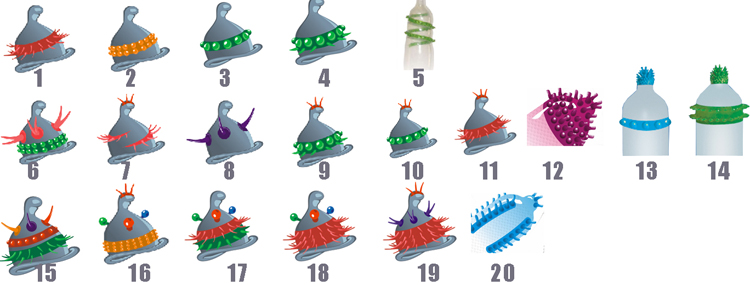Polyurethane condoms vs latex condoms both are ok for custom production
Modern condoms come in all shapes and sizes, from the no-nonsense varieties with no frills attached to the sensational studded condoms that make women go wow with delight. But when you look at the base materials that modern condoms are made of, it all boils down to two options: natural latex and polyurethane. Natural latex in its pure, unadulterated form is milky white and drawn from certain plants common in tropical jungles. This particular brand of latex can be used for a wide variety of purposes, but it is the rubber tree’s latex that is most commonly associated with latex. Fast fact: did you know that opium is made from the dried latex of the opium poppy? Polyurethane, on the other hand, is a form of synthetic latex. The main difference here is that while latex is drawn from plants, polyurethane is a kind of reaction polymer. To avoid having to dig up the nearest chemistry dictionary, let’s just say that polyurethane is made up of chemicals fused together to form a material very similar (but fundamentally different) to latex. Okay, now that you know a little bit about the composition of latex and polyurethane, it’s time we got down to the meat of the discussion: what differentiates a latex condom from a polyurethane condom? Thickness One of the first things you will notice about polyurethane condoms is that they are significantly thinner than latex condoms. Polyurethane is actually tougher than latex, which is why ultrathin condoms are made from polyurethane and not latex. Ultrathin condoms, on the other hand, are generally less tough than latex condoms. But that point is moot considering that manufacturers have to pass stringent FDA safety standards for condoms. This means a polyurethane condom can stand up to the pressures of vigorous sexual activity just as effectively as latex condoms. Price Latex condoms are typically cheaper than polyurethane condoms, which is why the average condoms you see on a store shelf are typically made of latex. Tapping a tree for rubber and then using that rubber to form a condom is generally cheaper than acquiring the materials required for synthesizing polyurethane. Fit Polyurethane condoms fit more naturally around the erect penis than latex condoms. Latex has this tight, restrictive quality when it squeezes down on the male penis.Polyurethane is a lot more elastic than latex. This extra elasticity lets the penis breathe when the condom is unrolled over it, significantly increasing sensitivity during sexual intercourse. This is perhaps one of the more common reasons why some men (and even some women) prefer ultrathin condoms over thicker latex condoms. Odor Latex condoms smell really rubbery when unsealed from their containers, especially in sachets where powder is used to lubricate the condom. This odor can be quite sickening if you are not used to the smell and can be a turnoff for some people. Polyurethane condoms, on the other hand, are basically odorless – at least if the lubricant used in the container has no odor as well. Forgiveness Polyurethane condoms are not recommended if you or your partner is unfamiliar with the proper use of condoms. Ultrathin polyurethane condoms tend to be damaged more easily with sharp pressure, like say from teeth or sharp fingernails. Latex condoms are more resistant to these kinds of forces, but not by much. Latex or polyurethane won’s be able to last long if the condom isn’t properly rolled on or if you accidentally bite a hole in the condom while opening the container. Oil-Lube Resistance Polyurethane condoms are much more resistant to oil-based lubricants (i.e. ordinary Vaseline) than latex condoms. It is still not a good idea to use these types of lubricants, so water-based and silicone-based lubricants are still the safer choice. Allergic Properties A lot of people – both male and female – are allergic to ordinary latex. You know you are allergic if your privates itch, redden or generally feel lousy after using latex condoms. Good news, though: polyurethane is non-allergenic. This means that you can always use polyurethane condoms if you or your partner is allergic to ordinary latex. Today, our company can produce both the type’s condom, latex male condom or latex female condom, polyurethane male condom or polyurethane female condom, all are ok for us to produce in your own brands, welcome inquiry us!






